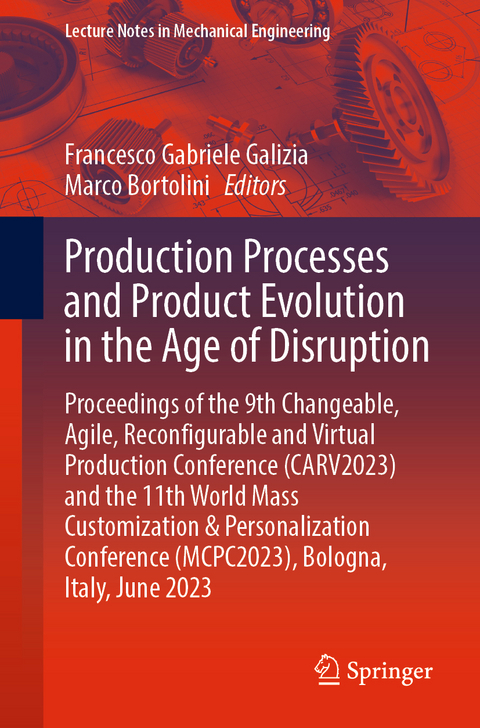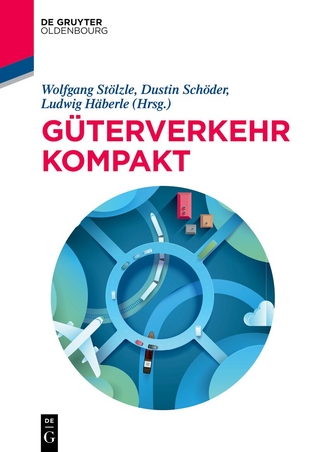
Production Processes and Product Evolution in the Age of Disruption
Springer International Publishing (Verlag)
978-3-031-34820-4 (ISBN)
Aldini Valeriani Foundation - Training dialogues with universities and business.- Managing Mass Customization.- Is Mass Customisation sustainable? A literature-based analysis.- Opportunities and Challenges of Mass Customization for Circular Economy: a literature-based analysis.- Tacking stock of prior research on the organizational capabilities for mass customization.- Unfolding the Complexity of Mass Customization: A Socio-Technical Perspective.- Is green personalisation possible? Dematerialising and deindividualising consumption.- The mass customization projects enactment in practice: Traditional vs agile project management.- Mass Customization in Networks: A Typology of Collaboration Forms.- Digital Process Chains for the Anthropometric Individualization of Products.- Production strategy selection in the mass customization era using analytic network process.- Recommendation of Mass Customized Products with a Multi-Agent System: A Case Study.- Product configurator as a monitoring tool for environmental impact: An AEC perspective.- Adoption potentials of Metaverse Omnichannel Retailing and its impact on Mass Customization approaches.- How to consider cognitive abilities of users in toolkit design.- A Framework for Solution Space Development in Mass Customization.- Openness and open-endedness: implications for mass customization capabilities.- Customer-centric UI/UX design for sustainable software systems.- Human Centered Innovation Workplaces.- Can the Mass Customization Co-Design Toolkit Help Healthcare Practitioners Reduce Bias and Achieve Better Patient Outcomes?.- Mass Customization and Socio-Environmental Responsibility and Sustainability of the Fashion Brand and Its Supply Chain.- Exploring the Added Value of Additive Manufacturing in Sales Processes of Mass Customization Products.- Development of an Individual Incentive System to Compensate for Fluctuations in Demand based on a Cluster Analysis.- Flexibility & Reconfigurability in Manufacturing & Operations.- Qualification Management in Reconfigurable Manufacturing System: review and new definitions.- A new Dynamic Simulation-Based approach for multi-part flow line configuration of a Reconfigurable Manufacturing System.- Mixed-Integer Programming and State-of-the-Art Heuristic Approaches for the Scheduling of Modular Automotive Body-in-White Production.- Identification and analysis of interactions between re-configurable supply chain enablers in industry 4.0 using DEMATEL method.- Reconfiguration of quality gates based on part variation modes in multi-stage manufacturing systems.- Enhancing Agility and Reconfigurability in Production: A Database-Driven Infrastructure to Support Additive Manufacturing with Collaborative Robotics.- Identification of the main reconfigurability characteristics enablers with a focus on the workforce.- A Conceptual Framework for Managing Agile Ramp-up.- Role of discrete event simulation in the assessment and selection of the potential reconfigurable manufacturing solutions.- Closing the Gap: Communicating Research to Industry through the REKON Dissemination Format.- Sequential vs. integrated model of process planning, layout and scheduling optimization for RMS.- Managing industrial automation: how knowledge graphs can boost production.- Prioritizing technology-enabled production improvements in SMEs: An Interpretive Structural Model.- Mapping production capabilities: proposing support towards changeable production.- Generalization of reinforcement learning agents for production control.- The RaRe² attempt as a holistic platform for decision support in rapidly changing process chains.- New Concepts for a flexible car body shop of hang-on parts: from lightweight engineering fixture to modular flexible cell concept.- A data model for predictive supply chain risk management.- Flexibility and Changeability for Software-defined Manufacturing.- Configuration of an AVS/RS using a data-driven queueing network model.- Sustainable Operations & CircularEconomy.- Challenges for textile SMEs to reach sustainability.- On the Sustainability indexing of Carbon Footprint reduction approaches for Manufacturing Industry.- Measuring environmental sustainability at logistics hubs: an international benchmark of greenhouse gas emissions.- The Integrated ESG Approach to assess sustainability: an application in the food and beverage sector.- Industrial symbiosis network optimization model for supporting by-products reuse.- Rapid assessment of circularity practices within the manufacturing industry.- De-manufacturing analysis for product repairability and serviceability in cooking systems.- Morphological analysis on the demanufacturing operations and End of life components sustainability: Rail industry.- Sustainability of medical gowns supply chain management in the post-Covid era.- Integration of Federated Learning to Smart Grid for Efficient and Secure Energy Distribution.- Flexibility in Global Supply Chains: A Hybrid Energy Consumption Simulation Approach.- Energy System Optimization Modelling and Electrical Grid Management: the case of Italy.- Process Documentation for the Agile Development of Wind Turbines using Subject-Oriented Modeling.- Design and Management of Assembly Systems.- A Competency Framework For Assembly Operators.- Graph-based and object-oriented description model for Changeable Assembly Systems.- End-Effector-dependent Evaluation of Task Executability by Mobile Robots in Changeable Assembly Stations.- A motion capture-based approach to human work analysis for industrial assembly workstations.- Framework for formulating competence-aware scheduling models in mixed-model assembly.- The Control Architecture KaReSA: A Learning Disassembly System.- CAD-based Product Partitioning for Automated Disassembly Sequence Planning with Community Detection.- Product-Process Design & Re-design Actions.- Influence of Time-Variant Robotic Welding Processes in Car Body Construction.- A Multimodal Distribution Model of Stochastic Process Times in Resistance Spot Welding.- A regression-based method for reduced order modelling of laser welding process.- Cutting parameters optimization for CNC rotary ultrasonic grinding of a crystal glass.- A Data and Connectivity based Process Control for Grinding Brake Disc.- CAD-based hygienic design for the development of food processing systems.- Opportunities and challenges of using plywood in data-driven parametric building construction.- Prefabrication of Fully Ecological, Membrane-Free Timber Constructions through Digital Manufacturing Methods.- Increasing Efficiency of Timber Structures using Digital Fabrication Methods for Demand-Specific Cross-Section Prefabrication.- Customization of Sustainability Factors and Housing-Needs in the Construction Industry. A Status Quo Analysis of House Configurators and Requirement Survey of Generation Y and Z.- Industry 4.0 & Enabling Technologies.- Models for the cost-benefit analysis of digitalization and Industry 4.0: a systematic literature review.- Introducing the Upskilling Framework - a learning factory approved for robotics focused on knowledge transfer and creation.- Managing Manufacturing Innovation: Four Types of Problems and Matching Innovation Processes.- Digital roadmap methodology for small and medium-sized manufacturing companies.- Open Source Hardware in Manufacturing - Opportunities and Challenges.- Digital twins in machine development and self-adjusting operations.- A Maturity Assessment Model for Digital Twin-Value Stream Technology in Greenhouses.- Digital Twin preparation for the prototyping phase, a use case.- An introduction and characterisation of non-identical digital twins in manufacturing systems.- Dynamic Value Stream Mapping - How Industry 4.0 can help us to learn to see better.- Artificial Intelligence implementation strategy for industrial companies using the AI tool box - A Morphology for selecting relevant AI use cases.- AI-based recommender system for optimization of the offermanagement in special machine engineering.- Simulation-based improvement of production in the textile industry - A case study.- Building Optimal Consortia in Smart Production Ecosystems.- Mutualistic networks for decentralized task allocation in human-robot teams.- Dynamic Task Allocation For Collaborative Robot Systems.- Optimizing makespan in single-model assembly lines with human-robot Collaboration.- Towards self-organized logistics planning in decentralised production systems via agent-based modelling.- Exoskeletons to support manual material handling at work: a preliminary study.
| Erscheinungsdatum | 09.08.2023 |
|---|---|
| Reihe/Serie | Lecture Notes in Mechanical Engineering |
| Zusatzinfo | XXIII, 846 p. 259 illus., 204 illus. in color. |
| Verlagsort | Cham |
| Sprache | englisch |
| Maße | 155 x 235 mm |
| Gewicht | 1311 g |
| Themenwelt | Technik ► Maschinenbau |
| Wirtschaft ► Betriebswirtschaft / Management ► Logistik / Produktion | |
| Wirtschaft ► Betriebswirtschaft / Management ► Unternehmensführung / Management | |
| Schlagworte | Changeability, flexibility and reconfigurability • Global production systems • Human-machine interaction and smart automation • Innovating for smart production • Learning factories and smart labs • Manufacturing Systems Design • Product/process Co-evolution • Rapid product/process prototyping • Sustainability, de-manufacturing and re-manufacturing • Virtual, digital and smart factories |
| ISBN-10 | 3-031-34820-6 / 3031348206 |
| ISBN-13 | 978-3-031-34820-4 / 9783031348204 |
| Zustand | Neuware |
| Informationen gemäß Produktsicherheitsverordnung (GPSR) | |
| Haben Sie eine Frage zum Produkt? |
aus dem Bereich


